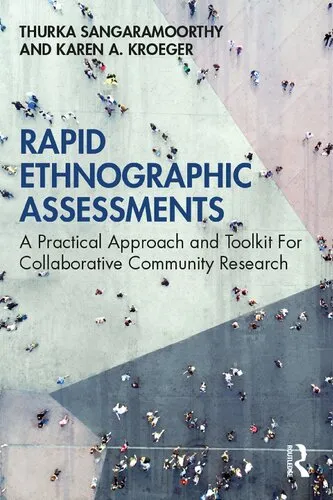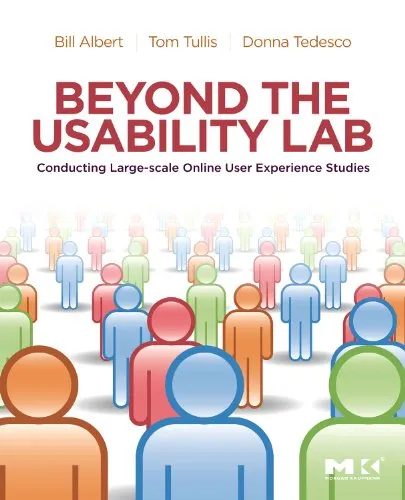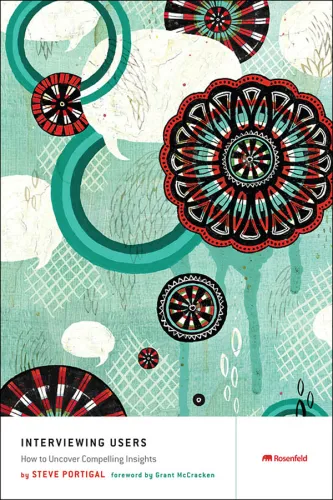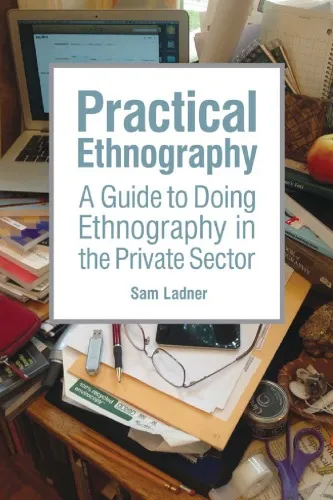Doing Ethnography
4.5
بر اساس نظر کاربران

شما میتونید سوالاتتون در باره کتاب رو از هوش مصنوعیش بعد از ورود بپرسید
هر دانلود یا پرسش از هوش مصنوعی 2 امتیاز لازم دارد، برای بدست آوردن امتیاز رایگان، به صفحه ی راهنمای امتیازات سر بزنید و یک سری کار ارزشمند انجام بدینکتاب های مرتبط:
معرفی کتاب "Doing Ethnography"
کتاب Doing Ethnography نوشته جیانپیترو گوبو، یکی از راهنماهای جامع و عملی برای انجام تحقیقاتی با رویکرد Ethnography است. این کتاب به محققان، دانشجویان و اساتید کمک میکند تا دانش و مهارتهای لازم برای طراحی، اجرا و تحلیل تحقیقات کیفی را کسب کنند. زبان ساده و مثالهای کاربردی این اثر باعث شده است تا به منبعی ارزشمند برای افراد در رشتههای مختلف علوم اجتماعی تبدیل شود.
خلاصهای جامع از کتاب
کتاب Doing Ethnography توانسته است اصول بنیادین Ethnography را با زبانی دقیق و ساختارمند توضیح دهد. این کتاب با معرفی مفاهیمی همچون مشاهده مشارکتی (Participant Observation) و مصاحبههای عمیق (In-depth Interviews)، راهنمای کاملی برای محققان است که قصد دارند فرهنگ، رفتار و تعاملات اجتماعی گروهها را بهصورت عمیق مطالعه کنند. جیانپیترو گوبو در این کتاب سعی دارد مرز بین نظریه و عمل را کاهش دهد و مجموعهای از ابزارها و تکنیکهای عملی برای انجام Ethnography ارائه دهد.
نکات کلیدی کتاب
- معرفی اصول و مفاهیم پایهای Ethnography
- توضیح دقیق روشهای گردآوری دادهها مانند مشاهده مشارکتی و مصاحبههای کیفی
- راهنمای طراحی تحقیقات کیفی و نوشتن گزارشهای علمی
- مطالعه کاربردی موارد واقعی برای فهم بهتر مفهوم فرهنگ و رفتارهای اجتماعی
- تمرکز بر اخلاق در پژوهشهای Ethnography و نحوه تعامل با جامعه مورد مطالعه
جملات مشهور از کتاب
"Ethnography is not just about observation, it’s about understanding the lived experience of others."
"In any research, the researcher’s ability to build trust is the cornerstone of collecting authentic data."
چرا این کتاب مهم است؟
این کتاب به دلیل رویکرد علمی و عملی خود به Ethnography جزو تأثیرگذارترین آثار در زمینه تحقیقهای کیفی به شمار میرود. امروزه، در حوزههایی همچون جامعهشناسی، انسانشناسی، مطالعات فرهنگی و حتی طراحی خدمات (Service Design)، استفاده از Ethnography برای درک عمیقتر مسائل اجتماعی وجود دارد. Doing Ethnography با ارائه مفاهیم پیچیده به زبانی ساده اما علمی، به بسیاری از محققان کمک کرده است تا تحقیقات خود را بهصورت علمیتر و دقیقتر طراحی و اجرا کنند.
این کتاب همچنین با تأکید بر اخلاق تحقیقاتی، به محققان یادآوری میکند که مسئولیتهای اجتماعی خود را هنگام کار با جوامع و فرهنگهای مختلف فراموش نکنند. این ویژگی، اثر گوبو را به یک مرجع ضروری برای دانشجویان و محققانی که تازه وارد این حوزه شدهاند یا در حال انجام تحقیقات پیشرفته هستند، تبدیل کرده است.
Welcome to the introduction of "Doing Ethnography", a comprehensive guide written by Giampietro Gobo that is designed to provide students, researchers, and practitioners with a rich understanding of ethnography as a methodology. The book offers a detailed exploration of the theoretical foundations of ethnographic research, practical approaches to conducting it, and the importance of ethnography in contemporary social research. Written with clarity and precision, "Doing Ethnography" combines academic depth with practical guidance to serve both novice and experienced researchers in navigating the complexities of qualitative fieldwork.
Detailed Summary of the Book
"Doing Ethnography" begins by laying the groundwork for understanding ethnography as more than just a method. It frames ethnography as both a methodological tool and a theoretical lens to explore the richness and complexity of cultural, social, and institutional life. The text delves into the philosophical roots of ethnography, providing a historical context that allows readers to appreciate its evolution over time. By examining its origins in anthropology and sociology, the book demonstrates how ethnography has become a cornerstone of qualitative research across disciplines.
A notable strength of the book is its practical orientation. Readers are guided step-by-step through the entirety of the ethnographic research process. This includes topics such as designing research projects, gaining access to fieldwork sites, conducting participant observation, collecting data through interviews and artifacts, and analyzing rich qualitative data. Gobo also emphasizes the ethical considerations and challenges of entering and immersing oneself into social settings, making this an essential manual for those new to the field.
Alongside practical guidance, "Doing Ethnography" introduces critical theoretical discussions, such as reflexivity, positionality, and the relationship between the researcher and the researched. Through these discussions, the book encourages readers to critically engage with their own role in constructing knowledge. It also critiques reliance on overly rigid frameworks and highlights the dynamic, fluid nature of real-world ethnographic research.
The final chapters explore how to present ethnographic findings through writing and other creative means, ensuring the work resonates both academically and practically. Grounded in real-world examples and case studies, the text showcases the diversity of applications ethnography can have, from academic inquiry to practical activities like organizational research or user experience analysis.
Key Takeaways
- Ethnography is not just a method but an epistemological approach to understanding human behaviors and social structures in depth.
- Conducting ethnographic research involves careful planning, ethical considerations, and reflexivity to ensure transparency and reliability.
- Participant observation and immersive fieldwork are at the heart of ethnographic practice, requiring patience, adaptability, and cultural sensitivity.
- Analysis and interpretation in ethnography depend on rigorous attention to detail, as well as the ability to contextualize findings within broader theoretical frameworks.
- Effective communication of ethnographic results is vital for bridging the gap between academic audiences and practical application in various industries.
Famous Quotes from the Book
"Ethnography is not about applying a pre-fixed methodology to collect data; it is about engaging in an intellectual enterprise to understand human experience."
"The ethnographic process is a journey that begins with seeing the ordinary through fresh eyes and ends with revealing the extraordinary within the mundane."
"Reflexivity is not just a choice for ethnographers, it is a necessity to ensure authenticity and ethical accountability."
Why This Book Matters
In an era defined by complex social dynamics and the increasing interconnectivity of global societies, the need for deep, qualitative insights into human behavior is more critical than ever. "Doing Ethnography" addresses this need by equipping readers with the knowledge and tools to conduct meticulous, ethical, and impactful research. Giampietro Gobo's approach to mixing theory and practice makes this book an indispensable resource for students, researchers, and professionals across disciplines.
Additionally, the book stands out for its accessibility. It demystifies ethnographic jargon, making it approachable for those new to the field while still offering depth for experienced practitioners. Its balanced focus on both the philosophical underpinnings of ethnography and its day-to-day execution ensures that readers gain a holistic understanding of the subject. Through its engaging narrative, practical examples, and emphasis on reflexivity, "Doing Ethnography" remains a timeless resource for anyone seeking to understand and shape the world through qualitative research.
دانلود رایگان مستقیم
شما میتونید سوالاتتون در باره کتاب رو از هوش مصنوعیش بعد از ورود بپرسید
دسترسی به کتابها از طریق پلتفرمهای قانونی و کتابخانههای عمومی نه تنها از حقوق نویسندگان و ناشران حمایت میکند، بلکه به پایداری فرهنگ کتابخوانی نیز کمک میرساند. پیش از دانلود، لحظهای به بررسی این گزینهها فکر کنید.
این کتاب رو در پلتفرم های دیگه ببینید
WorldCat به شما کمک میکنه تا کتاب ها رو در کتابخانه های سراسر دنیا پیدا کنید
امتیازها، نظرات تخصصی و صحبت ها درباره کتاب را در Goodreads ببینید
کتابهای کمیاب یا دست دوم را در AbeBooks پیدا کنید و بخرید
1428
بازدید4.5
امتیاز0
نظر98%
رضایتنظرات:
4.5
بر اساس 0 نظر کاربران
Questions & Answers
Ask questions about this book or help others by answering
No questions yet. Be the first to ask!
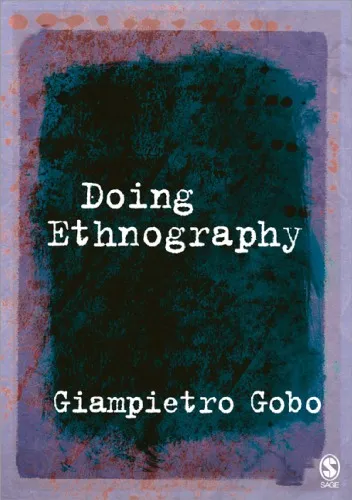

![Unleashing the Power of UX Analytics: Proven techniques and strategies for uncovering user insights [Team-IRA] [True PDF]](https://s3.refhub.ir/images/thumb/Unleashing_the_Power_of_UX_Analytics__Proven__9372.webp)





